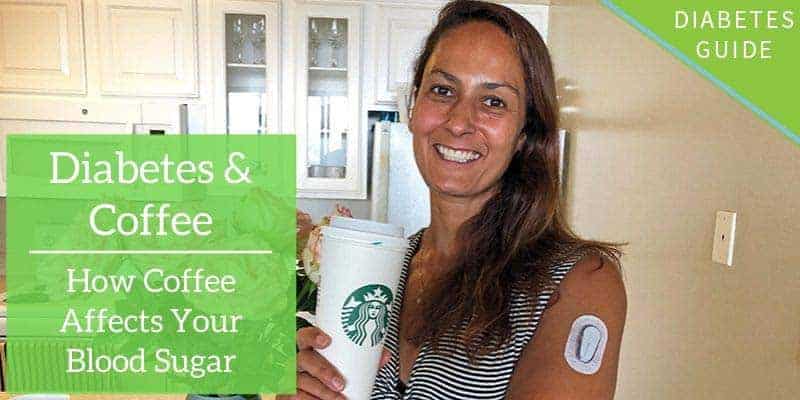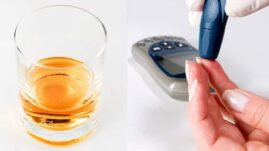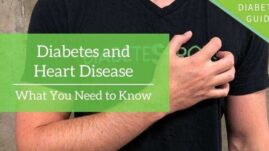Ah, that alluring smell of newly brewed coffee can make any coffee drinker yearn for a cup! But have you also noticed that sometimes (or maybe every time), your coffee and diabetes don’t seem to agree?
You might see your blood sugar shoot up after that first cup of coffee in the morning or maybe you find that you need extra insulin for your meal when you have a coffee on the side. And maybe that’s making you question; should or can people with diabetes have coffee?
In this post, I will explain everything you need to know about caffeinated beverages: How they impact blood sugar, their effect on insulin sensitivity, and if coffee is good for people with diabetes.

Table of Contents
- How does caffeine work?
- How much caffeine is in coffee, tea, etc.?
- How coffee affects your blood sugar
- Caffeine and insulin resistance
- Managing your blood sugar around coffee and other caffeinated beverages
- You could always switch to decaf!
- Health benefits of drinking coffee
- Side effects of drinking coffee
- Frequently asked questions
How does caffeine work?
We often talk about caffeine and drinks like coffee, RedBull, tea, and Coke as though we simply consume caffeine and suddenly you have energy. The way caffeine boosts your energy is actually much more complex than that!
Blocking adenosine receptors
Adenosine receptors (AR) normally work in your body to actually slow things down. Scientifically speaking, AR binds to your cells and slows down cell activity. This helps you fall asleep at bedtime, for example, or helps your body calm down and recover after intense activity.
When you drink caffeine, it actually blocks AR from binding to your cells which enables your cell activity to stay high, giving you more energy and preventing you from falling asleep.
Increasing other energy-producing chemicals
The presence of caffeine also tells your brain to produce more serotonin, dopamine, and acetylcholine.
These are neurotransmitters which essentially help your brain cells communicate. Serotonin, dopamine, and acetylcholine are classified as “neuromodulators” that help regulate your body’s physiological response to activity.
Dopamine and serotonin both have a very positive “rewarding” effect on the brain. An increase in dopamine production, for instance, can occur during a first kiss. It has a pleasing, exciting, giddy-like impact on your brain.
Acetylcholine influences how excited you might feel about something, but it also has a big impact on things unrelated to mood, like muscle function.
Releasing catecholamines
Caffeine also increases your body’s production of catecholamines. Catecholamines are essentially a category of hormones secreted from your adrenal glands. Your adrenal glands will release catecholamines into your bloodstream when you are in a physically or emotionally stressful situation. Those hormones then help your body endure and respond to that stressor.
One of those hormones is adrenaline — and this is exactly why and how caffeine can spike your blood sugar. Let’s take a closer look.
How much caffeine is in coffee, tea, etc.?
The answer to this question is complicated because different sources of coffee, for example, contain different amounts of caffeine. The darker the roast, for example, can significantly change the caffeine content.
A cup of coffee from Starbucks vs. Dunkin’ Donuts will offer vastly different caffeine quantities.
Use this easy “Caffeine Chart” to get a better idea of how much caffeine you’re consuming.
How coffee affects your blood sugar
Okay, so those catecholamines described above include the production of adrenaline (also known as “epinephrine”).
Adrenaline is known as the “flight or fight” hormone. It helps your body endure intense stress — good or bad — like a competition, a rollercoaster ride or a car accident.
Adrenaline helps you endure that stressful event by telling your liver to release stored energy…glucose!
Your liver has stores of glucose, known as glycogen, that it releases at different times every single day. That glycogen is then broken down and converted into glucose to give your body fuel.
During everyday life, your liver is releasing tiny amounts of glycogen between meals to give your brain that second-by-second delivery of glucose it needs in order to function.
During stressful events — like CrossFit or a car accident or a cup of coffee — your liver will release a larger dose of glycogen, giving your body a larger dose of glucose to use for fuel.
And that is how caffeine spikes your blood sugar.
Note: Coffee consumption, especially in the evening, can also decrease sleep quality for some people, which is a known course of decreased insulin sensitivity.
Caffeine and insulin resistance
A study consisting of 10 people with type 2 diabetes set out to determine the impact of regular caffeine consumption on overall insulin levels.
All participants were regular coffee drinkers, consuming about 4 cups of coffee per day, but they all stopped drinking coffee during the study. Then half of them were given capsules containing 250 mg of caffeine, and the other half were given placebo pills containing zero caffeine.
The result, according to the study: “On the days the patients took caffeine, their blood sugar levels were 8% higher. And after every meal — including dinner — their blood sugar spiked higher than it did on the day they had no caffeine.”
Does this mean people with diabetes shouldn’t drink coffee and other caffeinated beverages? Not necessarily. It means we should look closely at our caffeine consumption and moderate it just like we would with other things that impact our blood sugar levels.
Just because black coffee and green tea contain zero calories doesn’t mean we should drink them without limits. Instead, caffeine should ideally be something we consume carefully and set personal limits around for the sake of our overall diabetes health.
Managing your blood sugar around coffee and other caffeinated beverages
In general, you’d have to consume around 200 mg of caffeine to see a blood sugar impact. That’s about 1-2 cups of regular black coffee or 3-4 cups of black tea
However, we are all different and some of us may see a blood sugar impact from just a single cup of coffee while others may be able to drink several cups without any blood sugar changes.
Drinking caffeine at different times of day…
It’s also important to notice whether the time of day you drink caffeine or coffee changes the impact, too.
Most people experience some level of insulin resistance in the morning which wears off throughout the day. Adding coffee to an already insulin resistant situation can be the recipe for very high morning blood sugar. If you also have dawn phenomenon (high morning blood sugars), it might be an idea to convert your morning coffee into you afternoon pick-me-up
What are you adding to your coffee?
Even though those flavored creamers are a mere tablespoon of liquid, they are very high in sugar. Enough sugar to definitely cause an even larger spike in your blood sugar.
One of the most useful things you could do for yourself as a coffee drinker with diabetes is to gradually adjust your tastebuds to appreciate the taste of black coffee.
Try removing the sweetener and milk from your coffee for two weeks. Just two weeks! And see how you start to like the taste of black coffee! You might be surprised to find that you eventually find sweetened coffee to taste overwhelmingly sweet.
Using the spike from coffee to prevent lows…
If you tend to go low during or after exercising, you can use coffee as a way to limit that risk
Drink a cup of coffee about an hour before an intense cardio workout, for example, could prevent low blood sugars without requiring you to eat food, calories, carbs, etc. But remember not all types of exercise drives blood sugar down so you want to combine the coffee with the right type of exercise.
Do you need more insulin for coffee?
To better determine coffee’s impact on your blood sugar, create a simple experiment on a morning when you wake up with an “in-range” blood sugar. Drink a cup of coffee and see where your blood sugar goes during the 1 to 2 hours after that cup of coffee.
Many people simply find they need 1 unit of fast-acting insulin with a cup of coffee.
Or you could test your body’s response to coffee by removing coffee from your morning routine for a few days. Did your insulin needs drop? Were your blood sugars easier to manage? If so, that doesn’t mean you can’t go back to drinking coffee, but it does tell you that you need insulin to help your body deal with the effects of coffee.
It also tells you that limiting your coffee intake is likely a good idea!
You could always switch to decaf!
Caffeine is, of course, an addicting thing. Quitting a coffee habit means enduring pretty intense withdrawal headaches for at least a week or two.
But if you’d like to remove this caffeine variable from your diabetes management, you could always switch to decaf coffee.
There is a little bit of caffeine in decaf coffee but likely not enough to impact your blood sugar.
Either way, it’s all about balance — like everything else in life with diabetes!
Health benefits of drinking coffee
Recent studies have shown that drinking coffee can reduce the risk of developing some serious health conditions and even help you fight depression
- May protect you from Alzheimer’s disease – a 2002 study found that coffee drinkers have up to a 65% lower risk of Alzheimer’s disease
- May lower risk of Parkinson’s – studies show that consuming caffeine (not just coffee) significantly lowers the risk of developing Parkinson’s
- Protects your liver – a 2006 study found that there is an ingredient in coffee that protects against cirrhosis (scarring of the liver caused by many forms of liver diseases and conditions, such as hepatitis and chronic alcoholism)
- Fights depression – in a 2011 Harvard study, women who drank 4 or more cups of coffee per day had a 20% lower risk of becoming depressed
Side effects of drinking coffee
While coffee is safe to drink for almost everyone, it does have potential side effects that can be more or less severe depending on the individual:
- Headaches
- Anxiety
- Restlessness
- Sleep problems
For some, regular coffee drinking can also cause digestive issues.
In extremely rare cases, high doses of caffeine can induce psychotic and manic symptoms. People with panic disorder and performance social anxiety disorder should, therefore, be careful when consuming caffeine.
Frequently asked questions
Q: How many cups of coffee can I safely drink per day?
A: There is no absolute standard for this but a general recommendation is to limit caffeine consumption to 400 milligrams per day. That equals about 4 cups of coffee.
If your sleep, mood, or insulin sensitivity is being impacted by the amount of coffee you drink, limiting your intake is advised. It’s also always a good idea to limit or avoid both natural and artificial sweeteners if possible.
Q: Can coffee prevent type 2 diabetes?
A: Even though coffee generally increases insulin resistance (which is thought to be an important factor in developing type 2 diabetes), a 2014 study by researches from Harward who followed more than 100,000 coffee drinkers for 20 years found that people who increased their coffee intake by over one cup per day had an 11 percent lower risk of developing type 2 diabetes.
Also, people who reduced their coffee intake by one cup per day increased their risk of developing diabetes by 17 percent. There was no difference in those drinking tea.
It is not clear why drinking coffee (and not tea) should reduce the risk of developing type 2 diabetes, but the fact that just consuming caffeine did not reduce the risk of developing type 2 diabetes means that it’s most likely something else in coffee that has a positive effect.
Suggested next posts:




Lancelot Sanderson
Wish I’d known more about Diabetes Type-1. After 52 years of it I confess to have given up
with this and have become sick-of-needles! I just wish I knew how many more injections.
Christel Oerum
I understand the frustration. Although we don’t have a cure, we do have non-needle options such as insulin pumps or Afrezza, inhaled insulin (https://diabetesstrong.com/inhaled-insulin-afrezza/). It might be worth looking into if it can improve your quality of life
Philip Clark
I have been looking for a website that is so clear, with well-researched information, and provides such a wide range of resources and assistance to consider as I live with my diabetes. Truly, so helpful, and so well-presented. Thank you!
Jean-Philippe
This is a very complete and interesting article about coffee and T1 diabetes! Thanks for sharing with us, it’s so useful 🙂
I will try to evaluate how coffee affect my morning blood sugar. I’ve got a ratio of 1:4 for breakfast, 1:6 for lunch and 1:7 for supper.
Now I wonder if this higher ratio for real fast is not due to my coffeeS in the morning.
Again, thanks for sharing all that with us, this is so helpful and motivating ?
David
My blood sugar falls after drinking coffee. Why would that be? I can go from 96-80. Too much insulin released?
Christel Oerum
80 mg/dl is considered normal blood sugar so that’s great! Your body (sound like your body makes insulin) would react to the caffeine and adjust your blood sugars
Roy Porter
Wow…
What an awesome educational post.
Thank you for sharing! A real keeper.
CHARLIE LEE
Great article as my blood sugar spiked to 75% above avg after coffee intake this morning and i was lost. After reading about exercise need for sugar in your article, I did. 75 squat and sugar was average again!
Dawnett
Hello my name is dawnett my husband Eric and I found out Abt a week ago that Eric was diagnosed with diabetes. I didn’t know where to go or what to do or how to support him. So I got on Google and typed in how to support my husband with diabetes and it brought me to this site and your husband explaining how to support your spouse and I just wanted to say thank you so much the information that you and your husband have posted is so helpful and I am very appreciative of you for sharing your story and trying to help others. Thank you again!
Dawnett and Eric
Christel Oerum
Thank you so much for taking the time to write, and you’re very welcome.
I’m glad we can be a resource during, what I know can be a confusing scary time
Karen Carlino
Thank you for a very informative article. I am a T1D, diagnosed late in life at the age of 51 and have insulin resistance. I manage my diabetes with an insulin pump, CGM and recently started Metformin to help with insulin resistance. I am a self proclaimed coffee addict but have decreased my coffee consumption to 1 cup per day. I also get glucose spikes if I drink coffee first thing in the morning. Just curious if you get any health benefits from coffee if it’s decaf? or brewed versus instant? Thank you!
Christel Oerum
According to Healthline, the only real difference between decaf and caffeinated coffee is the caffeine. Quote: Decaf coffee contains similar amounts of antioxidants as regular coffee. These include mainly chlorogenic acid and other polyphenols. Decaf coffee also contains small amounts of several nutrients.
I haven’t researched instant coffee a lot but it seems to have the same health benefits as brewed coffee
Lynn
I have had T1D for 42 years and am now 62 yrs old. In the last month, I’ve been having stubborn glucose spikes that last 4-5 hrs after dinner and sometimes longer. I use a CGM and a Tandem pump. I have good control, last A1c was 6.2. I am a female and exercise daily and eat healthy.
BUT the unexpected high glucose has me perplexed….many nights after I finally get my glucose into a normal range, lows start and I’m eating glucose tablets till wee hours of the morning.
Starting to wonder about caffeine consumption. Does caffeine have a residual effect hours after drinking? It just seems strange to have this happening as caffeine hasn’t done this in the past. I am looking for suggestions. Thank you Christel for all you do to support those with T1D.
Christel Oerum
According to everything I have read, there can be a prolonged impact on insulin sensitivity. But it’s hard to say if that’s what going on with you. Any change in your meal composition could also do it, especially if you’ve added some good fat to your dinner.
But overall I’ve just found that our insulin needs change over time, if you can’t put your finger on anything specific your body might just need a tad bit more basal at that time
Leigh
Fortunately I’m not a regular coffee drinker but when I do drink it, it’s decaf. It still raises my BG unless I bolus for 20 carbs. So weird.
Christel Oerum
I’ve heard that before from others. Most importantly, you know, so you can dose for it. So I’d consider that a win
Chris J Beam
Christel,
You’re the best! I’m always amazed at the detail in your posts, and the relevant information. Thanks for sharing, and enlightening those of us with Type1. You’re a great role model!
Cheers,
Chris
Christel Oerum
Thank you! That’s very kind feedback